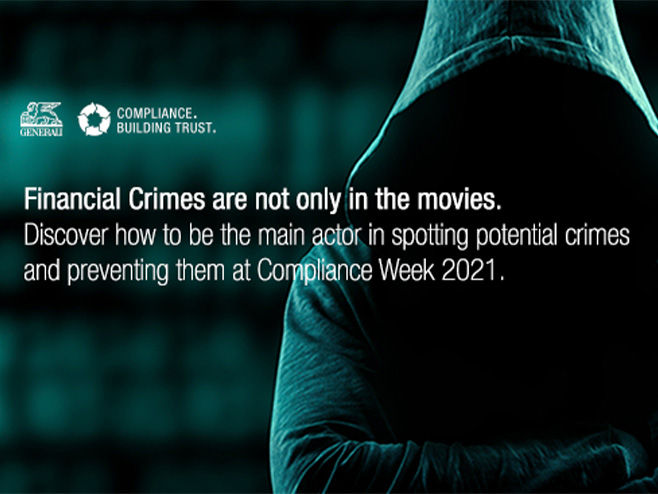22 December 2021
“The Pandemic Case”: mitigating cyber risk in the time of Covid-19
Compliance might be expensive, but non-compliance costs far more. The second webinar of Generali’s 2021 Compliance Week highlighted the urgent need for both companies and individuals to be proactive and vigilant to prevent and fight cybercrime – a threat that increased significantly with the pandemic
The Covid-19 pandemic has radically changed the way many businesses operate and consumers behave. At the same time, it has also created opportunities that are being exploited by criminals, who increasingly target the financial sector.
More and more financial institutions are experiencing cyber-crime losses due to pandemic-related crimes. Why? Because frauds exploit online breaches, which have increased due to social distancing, remote work and the accelerated digitization of the economy. That is why cybercrime is on the rise – and is expected to continue to increase, with multiplying cyber fraud techniques such as hacking, ransomware, phishing and identity theft.
We are also seeing increased levels of fraud and corruption in supply chains that have been disrupted due to Covid-19. This has a significant impact on the insurance sector, as it provides coverage to each element of the supply chains - for example transport, storage, and financing. Those who seek to evade or circumvent the economic sanctions may also seek to take advantage of these supply chain disruptions to find additional ways to bypass the controls and the procedures in place. How can companies protect themselves, and whose responsibility is it to prevent or reduce such risks?
All of this was the focus of “The Pandemic Case”, the second webinar organized in the framework of Generali’s 2021 Compliance Week, which explored how criminals are exploiting the financial system and how the financial system is responding to such threats. The event was enriched with interventions by Samar Pratt, Managing Director of Exiger; Michele Valeriani, Generali Group Head of Anti-Financial Crime; and Roberto Trebiani, Chief AML Officer of Banca Generali.
An expert in audit, assurance and technology-enabled solutions who led independent examinations of bank financial crime compliance programmes for US and UK Authorities, Samar Pratt illustrated how the pandemic has changed the dynamics of financial crime and its potential impact on the insurance sector. She also provided her perspective on what can happen if companies fail to comply with rules and regulations, sharing some examples of what has happened to firms when things have gone wrong. “Financial services firms like Generali are gatekeepers to the financial system. It is not just the responsibility of the compliance department. The business owns the risk. And every department has a role to play to make the world a safer place to do business”, she commented.
Indeed, the first line of defence (typically, business lines, operations, front office) is first accountable to mitigate financial crime risks and to apply the internal processes and procedures defined to effectively protect the Group and to apply the Group Risk Appetite Framework as decided by the Board. Because criminals regularly try to bypass controls, companies must be always proactive and vigilant, leveraging the available information to anticipate criminals (including cyber criminals), recognize “red flags” and intervene accordingly.
At the same time, all employees should be aware of this and understand the importance of their role in actively contributing to this continuous fight. As recalled by Samar, Michele and Roberto, ignorance is not an excuse.
In other words, every employee has a responsibility to protect the firm’s business and reputation, as highlighted by Michele Valeriani: “Everyone within large international companies must feel accountable in following the procedures and in applying the rules in place: protecting our reputation and doing business in a sustainable manner is not only a responsibility of those working in the ‘Compliance’ and ‘Anti-Financial Crime’ functions, but also, and especially, of those working in the first line of defence and in all other involved functions.”
He also added: “Quoting the CEO of a large international banking Group, ‘we cannot place a policeman next to each employee in the business’, therefore it is crucial that our procedures are defined, applied, and well acknowledged by everyone, and that training is regularly provided to make everyone aware of their responsibilities”. During his speech, he also provided an overview of the trend and priorities for the future of Generali’s Anti-Financial Crime function and stressed the need to proactively provide Business lines with practical solutions with a “can do approach”, including both in presence and remote regular training opportunities.
Finally, Roberto Trebiani provided an overview on the newly emerging threats affecting the banking industry, also as a consequence of the pandemic crisis. In addition, he considered practical examples of the main vulnerabilities of the economic system, focusing in particular on the abuse of public funds and illustrating the strategies put in place by Banca Generali to fight these illicit behaviours. “The coronavirus epidemic that has hit many countries, and in addition to causing a very serious health emergency, it has entailed new and significant risks of criminal infiltration into the economy. Anti-money laundering measures and especially the reporting of suspicious transactions represent an effective tool to combat these risks,” he concluded.
Generali’s Compliance Week is the yearly event addressed to all employees within the Group and aimed to raise awareness on relevant compliance topics. If you missed the first webinar of the Generali 2021 Compliance Week series, you can find it here - stay tuned for further updates and insights on the topic.

